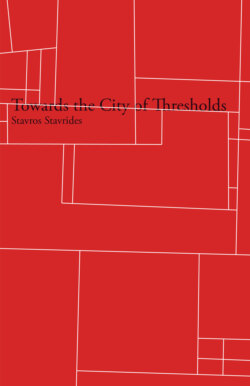Читать книгу Towards the City of Thresholds - Stavros Stavrides - Страница 9
На сайте Литреса книга снята с продажи.
Preface to the US edition
ОглавлениеCritical thinking seems to be an obvious task in current times of cynicism and phobic individualism. It becomes even more urgently needed as the discontent of those who suffer from predatory policies and aggressive privatization of public resources is dangerously courted by religions fundamentalisms and racist mentalities. If critical thinking has any meaning in such difficult times, it is to be found in attempts to show that another future, one based on solidarity, equality, and justice, is possible.
There have been times when utopian visions seemed the most appropriate way to illustrate a radically different future. And surely, criticism of the present was their propelling force. Realism and pragmatism have always been extremely strong opponents of utopian thinking, and their power to convince people that the experienced reality is the only one possible is always augmented by the ruling elites.
Moving forward we need something more than visions. We may argue that concrete critical ideas for an equalitarian future will provide a realist alternative to the utopian nightmares of pervasive capitalism. We can dream of a different future by constructing it in, against, and beyond the unjust societies we live in.
This book is meant to be a modest contribution to the study of existing struggles that gesture towards an emancipated and emancipatory society. It combines critical thought with concrete experiences, the power of political imagination with the inspiring thrust of acts that produce new relations between people. A large part of it is focused on criticizing obsessive efforts to defend identities which, more often than not, trap people in roles and habits that prolong their attachment to the dominant values of individualization. The core argument of the book is developed around the issue of otherness: how do we deal with otherness in ways that produce exchanges and encounters without effacing differences and without merely establishing tolerance?
By carefully studying the inventiveness of people in struggle, as well as the potentialities hidden in many everyday routines and habits, this book suggests that experiences and symbolizations of space play a crucial role in the construction of bridges towards otherness. Differences that are either augmented in order to be exploited (as the differences between locals and immigrants) or effaced so that possible resistances are eliminated (such as the differences between “Western” and Indigenous value systems) need to be offered the possibility to negotiate on an equal basis in the search for a shared world.
This is where the idea of the city of thresholds becomes not just one more smart term for something but an emblematic condensation of a different social world of human emancipation. Thresholds unite as they separate. Thresholds mark areas of potential change. Thresholds create areas of communication out of differences that do not cancel each other.
Today’s important struggles arise out of collective experiences of deprivation and poverty as well as of stigmatization and discrimination. Indigenous peoples’ struggles; struggles for collective and individual dignity in work, education, and health; struggles in support of different forms of sexuality, belief, and culture; struggles for the defense of common goods and resources; struggles for gender equality; struggles against the ruling elites who destroy nature (and us, as part of nature). All of these struggles need to explore bridges, thresholds, and passages between themselves in order to construct networks of solidarity and shared hopes.
All-encompassing plans for an emancipatory future have often turned into nightmares, possibly because the richness of practices of transition was either ignored or suppressed. Transition is not simply a means to an end; experiences of transition unleash potentialities of change that are experienced in the present. In place of borders between a capitalist present and a liberated future, today’s struggles create passages towards an emancipating beyond. They show people—beyond those who participate in them—that another kind of social relations is possible. In small-scale thresholds towards the future, as in the everydayness of neighborhood relations based on mutual aid, as well as in large-scale thresholds like those briefly opened by the occupied squares movement or, more permanently by the struggles of the Zapatistas, the lives of real existing people become open to change. The search for ways to take hold of lives wasted in cruel divisive societies (if not in cruel wars) makes people inventive. As members of societies in movement, orienting this inventiveness towards the construction of thresholds might be our task. And sharing, as a multileveled process of equalitarian solidarity, will have to be invented anew—not only as a practice that defies antagonism and egoistic reasoning but also as a process of constructing alternative social relations.
Is the city of thresholds one more canonic utopia? Is it a conceptually neat utopia, perhaps? I hope not, because I experienced it in the Syntagma Square occupation in 2011and I keep sensing its flavor in everyday actions of mutual aid in crisis-ridden Athens. I also saw it emerging previously in the heterotopias of the 2008 December uprising. And I believe we may trace its characteristics in the many spaces of contemporary urban commoning that develop within and against the city of enclaves.
Approaching otherness and creating shared worlds may indeed be developed through concrete urban experiences. Otherwise, dreams, no matter how urgently needed, tend to cover up reality. To explore the possible existing beyond capitalism and domination, we might need to develop new ways to enact the possible. Not in enclaves of heroic otherness but through metastatic thresholds in which human liberation is developed and tested.
Athens
March 2018
